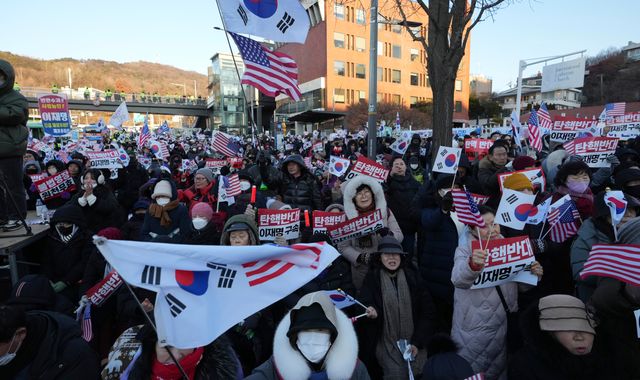South Korea: Political Upheaval in the Land of the Morning Calm
The political crisis engulfing South Korea has sent shockwaves through its political and economic systems, raising questions about the nation’s future. How will South Korea emerge from this turmoil while maintaining its democratic foundations and international standing?
SOUTH KOREA
Taissiya Sheguy
1/22/20253 min read


Late on 3 December 2024, South Korean President Yoon Suk-yeol declared martial law in an unprecedented move, marking the first such action in the country since 1979. In an emergency address, Yoon described the decision as vital to safeguarding the constitutional order against “communist forces” and threats from North Korea. He also cited the need to neutralise “anti-state elements,” later clarifying that this referred to opposition lawmakers whom he accused of paralysing government functions through attempts to impeach high-ranking officials, including the Ministers of Internal Affairs and Defence.
The declaration authorised military intervention in the capital, with instructions to blockade the National Assembly. Chief of Staff of the Ground Forces, General Park Ahn-soo, was tasked with enforcing the decree. Under the martial law provisions, all political activities, including parliamentary sessions, were suspended, as were rallies and strikes. Media operations were placed under military control, with restrictions on the dissemination of what the decree termed “fake news” and “false propaganda.”
The president’s decision provoked immediate backlash from the opposition. Lawmakers urged citizens to mobilise against what they labelled an unconstitutional power grab. Protesters gathered in the streets of Seoul, chanting slogans such as “No martial law” and “Overthrow the dictatorship.” Despite the restrictions, media outlets continued live coverage, capturing scenes of resistance as lawmakers defied the blockade to gain access to the National Assembly. The parliament convened and successfully passed a resolution overturning the martial law order.
Facing mounting pressure, Yoon lifted martial law within hours on the morning of 4 December. The same day, six opposition parties filed an impeachment motion against him. After an initial failure to reach quorum on 7 December, a second vote on 14 December resulted in Yoon’s impeachment.
The political upheaval sparked widespread protests, with more than a million demonstrators across the country demanding accountability. The Korean Central News Agency (KCNA) described the situation as a shocking collapse of governance, criticising Yoon’s actions for plunging South Korea into chaos.
The turmoil deepened on 27 December, when parliament passed a motion to impeach Acting President and Prime Minister Han Duck-soo, with 192 out of 300 lawmakers supporting the resolution.
By January 2025, tensions in South Korea had escalated further. On 7 January, an arrest warrant for Yoon was extended, though he remained in his official residence, shielded by his guards. Protests by both supporters and opponents of the former president continued to intensify. On 8 January, Yoon’s personal security detail thwarted law enforcement’s attempts to detain him, prompting outrage among the public and further polarising the nation.
On 15 January, Yoon was arrested at his official residence on charges of sedition and abuse of power. The arrest was marked by violent clashes between his guards and law enforcement, while his supporters staged riots outside the courthouse. In a statement following his arrest, Yoon claimed that he had surrendered voluntarily to prevent “bloodshed” and dismissed the charges as politically motivated, accusing the legal system of collapsing under partisan pressure.
Yoon appeared at the Constitutional Court on 21 January to face his impeachment trial, where he reiterated his denial of wrongdoing. His appearance came amidst heightened security, with protests continuing outside the courthouse.
The crisis has had profound economic repercussions. The Korean won fell to a 15-year low against the US dollar, while the KOSPI stock index suffered significant losses, rattling investor confidence. The Bank of Korea maintained its benchmark interest rate at 3 per cent, citing concerns over political instability and the currency’s decline. Governor Lee Chang-yong emphasised that economic stability hinged on resolving the political crisis. The government downgraded its 2025 GDP growth forecast from 2.2 per cent to 1.8 per cent, citing diminished consumer confidence and disruptions to business activity.
Compounding the uncertainty is Donald Trump’s re-election as President of the United States. Proposed tariffs and adjustments to electric vehicle subsidy policies threaten South Korea’s trade relationship with its largest export market. These developments, coupled with South Korea’s political instability, could strain relations with key neighbours such as Japan and China, potentially disrupting global supply chains in the technology and automotive sectors.
Foreign direct investment has also come under threat, with businesses reconsidering expansion plans due to the uncertain climate. Analysts warn that South Korea’s semiconductor and automobile industries, already facing intensified competition from China, could face further challenges in the months ahead.
As South Korea grapples with its most severe political crisis in decades, the nation’s economic stability, international reputation, and democratic resilience hang in the balance.


